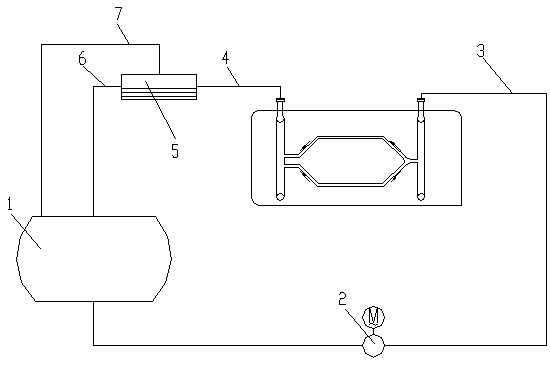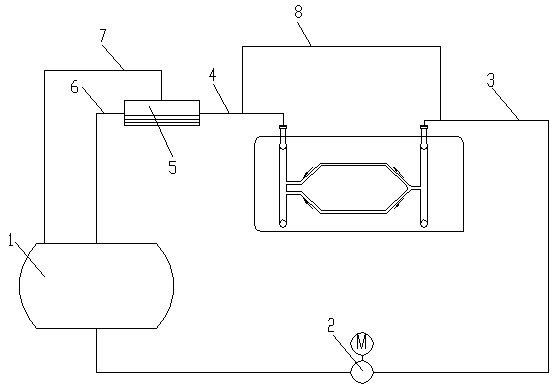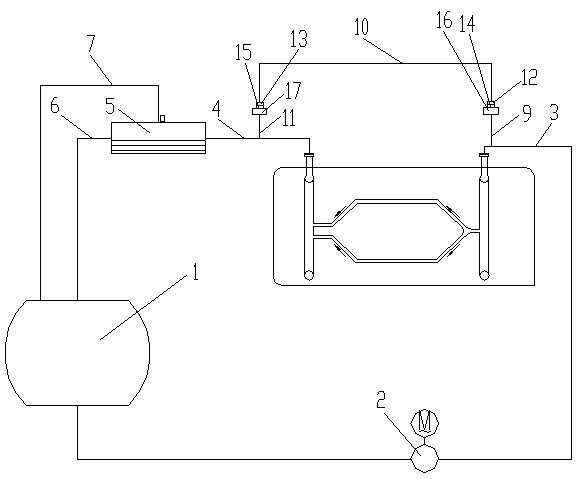Generator stator cooling water system anti-siphon method
A technology of generator stator and cooling water system, applied in cooling/ventilation devices, electrical components, electromechanical devices, etc.
- Summary
- Abstract
- Description
- Claims
- Application Information
AI Technical Summary
Problems solved by technology
Method used
Image
Examples
Embodiment 1
[0042] An anti-siphon method for a generator stator cooling water system, comprising the following steps:
[0043] a. Connect the water inlet pipe 3 of the anti-siphon device to the inlet of the generator stator coil, and connect the water outlet pipe 4 of the anti-siphon device to the outlet of the generator stator coil;
[0044] b. Place the expander 5 of the anti-siphon device in a spatial position higher than the outlet of the generator stator coil, and the expander 5 is connected between the outlet of the generator stator coil and the water tank 1 through pipelines to form a generator stator coil a cooling water flow channel from the outlet to the inlet of the water tank 1;
[0045] c. Use the air pipe 7 to connect the expansion vessel 5 with the upper part of the water tank 1 to form an air flow passage from the upper part of the water tank 1 to the expansion vessel 5, and guide the air in the upper part of the water tank 1 into the expansion vessel 5 through the air flo...
Embodiment 2
[0048] An anti-siphon method for a generator stator cooling water system, comprising the following steps:
[0049] a. Connect the water inlet pipe 3 of the anti-siphon device to the inlet of the generator stator coil, and connect the water outlet pipe 4 of the anti-siphon device to the outlet of the generator stator coil;
[0050] b. Place the expander 5 of the anti-siphon device in a spatial position higher than the outlet of the generator stator coil, and the expander 5 is connected between the outlet of the generator stator coil and the water tank 1 through pipelines to form a generator stator coil a cooling water flow channel from the outlet to the inlet of the water tank 1;
[0051] c. Use the air pipe 7 to connect the expansion vessel 5 with the upper part of the water tank 1 to form an air flow passage from the upper part of the water tank 1 to the expansion vessel 5, and guide the air in the upper part of the water tank 1 into the expansion vessel 5 through the air flo...
Embodiment 3
[0055] An anti-siphon method for a generator stator cooling water system, comprising the following steps:
[0056] a. Connect the water inlet pipe 3 of the anti-siphon device to the inlet of the generator stator coil, and connect the water outlet pipe 4 of the anti-siphon device to the outlet of the generator stator coil;
[0057] b. Place the expander 5 of the anti-siphon device in a spatial position higher than the outlet of the generator stator coil, and the expander 5 is connected between the outlet of the generator stator coil and the water tank 1 through pipelines to form a generator stator coil a cooling water flow channel from the outlet to the inlet of the water tank 1;
[0058] c. Use the air pipe 7 to connect the expansion vessel 5 with the upper part of the water tank 1 to form an air flow passage from the upper part of the water tank 1 to the expansion vessel 5, and guide the air in the upper part of the water tank 1 into the expansion vessel 5 through the air flo...
PUM
| Property | Measurement | Unit |
|---|---|---|
| The inside diameter of | aaaaa | aaaaa |
| The inside diameter of | aaaaa | aaaaa |
Abstract
Description
Claims
Application Information
 Login to View More
Login to View More - R&D
- Intellectual Property
- Life Sciences
- Materials
- Tech Scout
- Unparalleled Data Quality
- Higher Quality Content
- 60% Fewer Hallucinations
Browse by: Latest US Patents, China's latest patents, Technical Efficacy Thesaurus, Application Domain, Technology Topic, Popular Technical Reports.
© 2025 PatSnap. All rights reserved.Legal|Privacy policy|Modern Slavery Act Transparency Statement|Sitemap|About US| Contact US: help@patsnap.com



